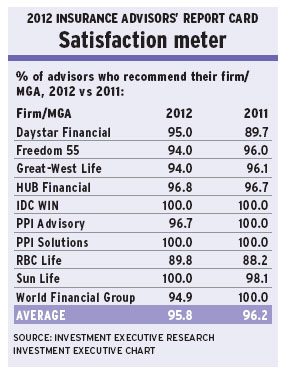
The steady level of satisfaction that many insurance advisors had felt with their firms during the financial crisis has finally started to slip, with some firms seeing lower performance ratings vs advisors’ expectations. In fact, lack of communication, along with archaic technology tools and delays in the back office, are leading more advisors to show frustration in this year’s Insurance Advisors’ Report Card.
“Communication from head office needs to improve,” says an advisor in Ontario with Woodbridge, Ont.-based Hub Financial Inc. “It would be good to know what’s going on once in a while or if there are going to be any big changes.”
Adds an advisor in British Columbia with Winnipeg-based Great-West Life Assurance Co.: “Everything electronic at the firm needs improvement – technology tools, the company’s website, as well as the client portal.”
Advisors had their say by rating their firms’ performance in 43 categories (plus the “overall rating by advisors”), as well as the importance of each category to their businesses, on a scale of zero to 10, with zero meaning “poor” or “unimportant” and 10 meaning “excellent” or “critically important.”
This year, Investment Executive researchers Brent Jolly, Johnna Ruocco and Gian Verano spoke with 377 insurance advisors at three dedicated sales agencies and seven independent sales agencies (six of which are managing general agencies [MGAs]) across Canada.
Although “firm’s/MGA’s ethics” remains in the top spot for what advisors value the most, “MGA’s compliance on the insurance side” has jumped into second place. In a three-way tie for third place in importance were “firm’s/MGA’s total compensation, “firm’s stability” and “freedom to make objective product choices for clients.”
This shift in importance ratings shows that times are indeed changing in the insurance industry in terms of the attitude toward compliance and regulation.
“There was a time, not too long ago, when compliance wasn’t a concern for anybody,” says an advisor in B.C. with Vaughan, Ont.-based World Financial Group Insurance Agency of Canada Inc. (WFG).
The Canadian Council of Insurance Regulators’ (CCIR’s) most recent report on the subject, released in May, recommends that MGAs be subject to greater oversight by both insurance companies and provincial insurance regulators. In light of this report, it’s not surprising that advisors are starting to place a higher value on compliance.
The CCIR has published comments submitted by the public regarding its report and is expected to finalize the report in September. As the initiative inches closer to reality, it’s becoming more evident that the majority of advisors support it.
In fact, 68.7% of independent advisors surveyed for this year’s Report Card agreed that MGAs should be regulated; that’s up by almost five percentage points over last year’s survey.
Although more than two-thirds of independent advisors agree regulation needs to be developed for the insurance sector, most are quick to point out that they do not want to see regulation implemented in the same fashion as it was in the mutual fund industry.
“The regulation of MGAs should not be the same as it is for mutual funds,” says an advisor in Ontario with Mississauga, Ont.-based IDC Worldsource Insurance Network Inc. (IDC WIN). “They’re two different animals.”
Adds an advisor in Ontario with Winnipeg-based Daystar Financial Group Inc.: “MGAs need to be regulated … we need it, but not MFDA-style.”
MGAs are already getting prepared for the change so that if and when the time comes, they will be prepared.
“I think it’s going to happen, and I think it’s going to happen very fast when it does,” says Ron Madzia, president of IDC WIN. “I think in order to have the infrastructure to support that type of business model, you are going to have to have scale. Scale is going to be really important.”
In addition to gauging advisors’ perception of MGA regulation, this year’s Report Card also saw the addition of a new question: “firm’s/MGA’s rewards/recognition program.” Calgary-based PPI Solutions Inc. had the top rating of 9.2 in the category; in fact, this MGA also had top ratings in 28 other categories that applied to it, as well as in the “IE rating” and the overall rating by advisors.
Since PPI Solutions entered the survey for the first time in 2010, it has seen its performance ratings rise in important areas such as “firm’s/MGA’s strategic focus,” and “firm’s delivery on promises.” Says a PPI Solutions advisor in B.C.: “I’m pretty sure we are the biggest guy in the MGA sandbox in Canada at the moment.”
However, both IDC WIN and WFG – two independent sales agencies that have experienced good growth recently – saw their ratings decline by half a point or more in 18 categories, as well as in both the IE rating and the overall rating by advisors.
IDC WIN’s drops are not that surprising because the firm is only one year removed from its birth – the merger of IDC Financial Inc. and Worldsource Insurance Network Inc. Many firms that go through a merger see a dip in ratings the following year, only to bounce back in subsequent surveys.
Still, despite the decline in IDC WIN’s ratings, it’s important to note that the firm continues to maintain a very strong position in the Report Card. This MGA had the second-highest ratings in many categories, including the IE rating and the overall rating by advisors.
Although many IDC WIN advisors are happy with the merger, some are concerned about the MGA’s strategic focus and the direction in which the firm is heading.
“We’ve taken on too many advisors too quickly and they haven’t focused on rewarding the good ones well enough,” says an IDC WIN advisor in Ontario. “It’s a kind of scattered strategy.”
© 2012 Investment Executive. All rights reserved.